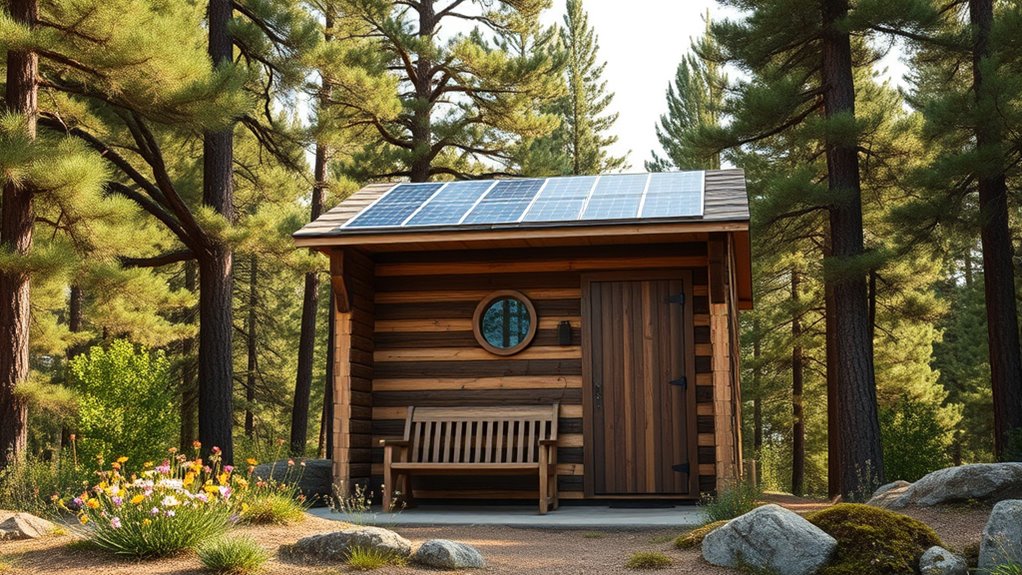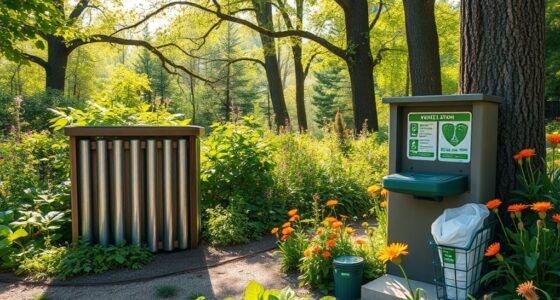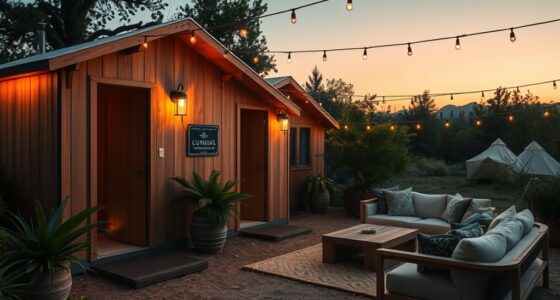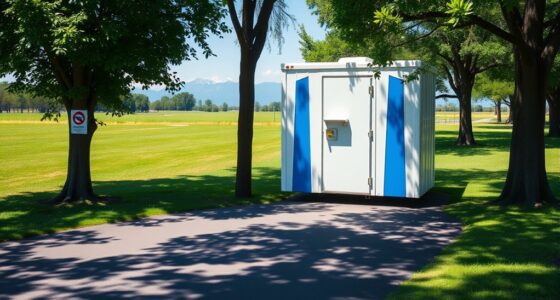When designing off-grid restrooms for remote campsites, focus on sustainable waste management by choosing composting toilets or bio-digesters, which minimize water use and produce useful byproducts. Prioritize durable, eco-friendly materials, incorporate natural ventilation, and consider solar-powered systems for water recycling and biogas generation. Guarantee easy access for maintenance and blend the structure into its environment. Keep exploring these strategies to create eco-conscious, efficient facilities that work seamlessly without traditional plumbing.
Key Takeaways
- Choose composting or waterless toilets to minimize water use and facilitate sustainable waste management.
- Incorporate natural ventilation, shading, and insulation for odor control and user comfort.
- Use durable, eco-friendly materials like reclaimed wood or local stone for structure and environmental harmony.
- Implement biogas systems or bio-digesters to convert waste into usable energy and reduce disposal needs.
- Design for easy access to waste removal and maintenance, ensuring efficient operation in remote locations.

Creating off-grid restrooms requires careful planning to guarantee functionality, sustainability, and comfort in remote locations. When designing these facilities, your priority should be sustainable waste management. You need a system that effectively handles human waste without relying on traditional sewer lines or extensive infrastructure. Composting toilets are a popular choice because they convert waste into usable compost while minimizing water use. Choose a model that suits your campsite’s size and expected usage, ensuring it’s easy to maintain and clean. Proper ventilation is essential to control odors and promote decomposition, making the experience more comfortable for users. Additionally, you should consider incorporating a hand-washing station that uses eco-friendly plumbing solutions, like greywater recycling systems, to reduce water consumption further.
Eco-friendly plumbing plays a crucial role in off-grid restroom design. Instead of conventional water-heavy fixtures, opt for low-flow or waterless options that conserve resources. For example, you can install solar-powered pumps for greywater recycling, which captures and reuses water from sinks and showers. This not only reduces your water footprint but also ensures a continuous supply, even in areas with limited access to fresh water sources. Using biodegradable cleaning products and minimal plumbing fixtures minimizes environmental impact. When selecting plumbing components, prioritize durable, corrosion-resistant materials that can withstand the elements and require less frequent replacement. Properly insulated pipes help prevent freezing in colder climates, maintaining system integrity year-round. Incorporating shading and natural ventilation can further improve comfort and energy efficiency by reducing heat buildup and odors.
To promote sustainability, you should also think about waste disposal. If composting toilets aren’t feasible, consider bio-digesters or other closed-loop systems that break down waste biologically, producing biogas that can be used for cooking or heating. These systems reduce the need for frequent waste removal and help generate renewable energy on-site. When designing the restroom layout, ensure easy access for maintenance, with clear pathways for waste removal and system servicing. Incorporate natural materials like reclaimed wood or locally sourced stone to blend the structure into its environment while reducing environmental impact. Adequate shading and ventilation will improve comfort and help regulate temperature, making the restroom a more pleasant space for users.
Frequently Asked Questions
How Do Off-Grid Restrooms Handle Waste Management Long-Term?
You wonder how off-grid restrooms manage waste long-term. They typically use eco-friendly solutions like sewage treatment systems that break down waste naturally, minimizing environmental impact. Water recycling plays a key role, as they often reuse greywater for flushing or irrigation, reducing water use. These systems are designed for sustainability, ensuring waste is safely processed without connection to municipal sewage, making them ideal for remote locations.
What Are the Most Eco-Friendly Materials for Off-Grid Restroom Construction?
Imagine building a restroom that blends seamlessly into nature, using eco-friendly materials. You can choose biodegradable plastics that break down gently, leaving no harmful residue. Reclaimed wood adds rustic charm and reduces demand for new resources, giving old wood a new purpose. These materials help protect the environment, ensuring your off-grid restroom is sustainable, durable, and kind to the planet, creating a harmonious space that respects nature’s beauty.
How Can Off-Grid Restrooms Be Designed for Accessibility?
To guarantee off-grid restrooms are accessible, you need to focus on universal design principles that accommodate everyone. You can achieve this by including features like wider doorways, ramps, and grab bars to support mobility accessibility. Make sure the layout is simple and clear, allowing easy navigation for all users. Prioritize comfort and safety, creating an inclusive environment that everyone can use comfortably, regardless of physical abilities.
What Maintenance Is Required for Off-Grid Restroom Systems?
You need to perform regular septic system maintenance, checking for leaks and odors, and guarantee it’s functioning properly. Plumbing inspection is crucial to identify any clogs or damage early. Clean or replace composting components if used, and keep the system dry to prevent issues. Regular upkeep like these keeps your off-grid restroom running smoothly, minimizes environmental impact, and extends system lifespan.
How Do Off-Grid Restrooms Prevent Odors and Pests?
Did you know that poor ventilation causes 80% of restroom odors? To prevent odors and pests, you should install effective ventilation systems that circulate fresh air and remove smells. Using pest control methods like sealed lids, screens, and natural repellents keeps pests out. Proper ventilation and pest control work together to maintain a clean, odor-free environment, making your off-grid restroom more comfortable and hygienic.
Conclusion
Remember, off-grid restrooms are essential for sustainable camping. While some worry about maintenance or odor, choosing eco-friendly solutions like composting toilets makes it manageable. With proper design and regular upkeep, you’ll find these facilities not only convenient but also environmentally responsible. Don’t let concerns hold you back—embrace off-grid restrooms to enjoy a truly eco-conscious outdoor experience, ensuring your campsite stays pristine for generations to come.









